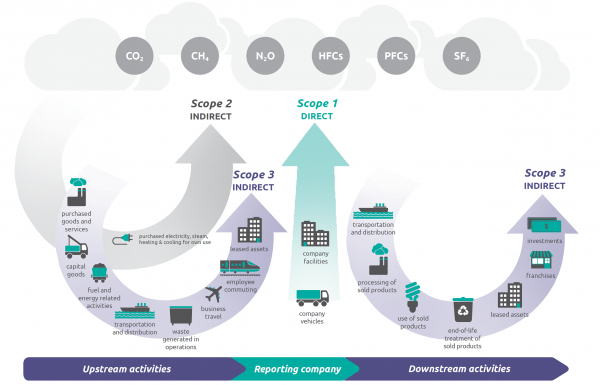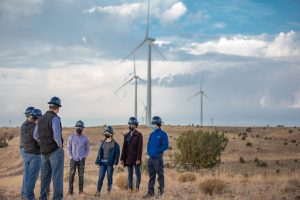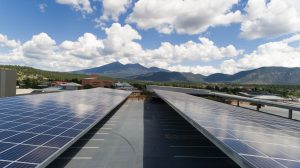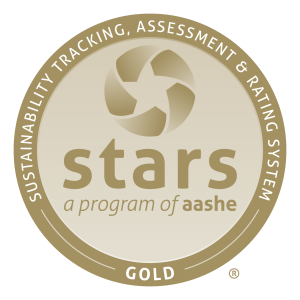Climate Action Plan
NAU is committed to carbon neutrality by 2030. Located in Arizona, we face increased climate vulnerabilities such as water scarcity, extreme heat waves, wildfires, and public health issues. As an institutional leader, NAU is responding to this global issue with a focus on adaptability, innovation, and stewardship. Recognizing the urgent need to rapidly adopt renewable energy solutions and sustainable operations responding to the deep commitment of the larger NAU community to climate action and sustainability, President Cruz-Rivera has committed to:
“heightened investments of the university community’s time, talents, effort, and resources to securing the conditions needed to achieve carbon neutrality by 2030”.
NAU is a leader in higher education for sustainability and a founding signee of the American College & University Presidents’ Climate Commitment (ACUPCC) and the Second Nature Carbon Pledge in 2007. NAU is proud of the City of Flagstaff Climate Emergency Declaration and its leadership within our community. We are focused on community engagement to ensure that we create a plan that reflects the current needs of our greater campus community.

FY24 Annual Sustainability Report
How NAU will accomplish these goals:
The climate action efforts detailed within the CAP are not just about what NAU will do but how NAU will implement these actions in a cost-effective manner aligned with NAU’s mission and commitment to “educate, support, and empower students from all backgrounds, identities, and lived experiences to reach their full potential and contribute to a more just, equitable, inclusive, prosperous, and sustainable future”.
Maximizing Resource Conservation and Efficiency Accordion Closed
NAU can cut 20 percent of its current Scope 1 and 2 emissions by maximizing energy and water efficiency. Maximizing our efficiency yields an estimated $2.8M in annual utility savings by 2030, as well as improved occupant comfort, function, and resiliency of NAU buildings and infrastructure.
Purchasing Clean and Renewable Electricity Accordion Closed
Transitioning to carbon-free electricity to power NAU’s operations will result in a 54 percent reduction in NAU’s current operating emissions and signal to the NAU community, state, and nation our commitment and capacity to get to net zero.
Decarbonizing District Heating and Cooling Systems Accordion Closed
Natural gas represents 42 percent of NAU’s current carbon emissions. NAU will address this by converting the district heating system to low-temperature hot water and connecting North and South plants are two initial steps necessary to maintain system function and to improve climate resilience before eliminating natural gas. Also, NAU will convert the current natural gas-powered building boilers and all on-campus appliances to electric.
Electrifying NAU’s Fleet and Eliminating Emissions Accordion Closed
Electric vehicles are a way to demonstrate NAU’s commitment to a carbon-free future and will reduce current emissions by approximately five percent over the next eight years by right-sizing the fleet and producing cost savings over the lifetime of each vehicle compared to internal combustion engines. Other benefits include reducing noise and air pollution. NAU has recently approved an all-electric vehicle purchasing policy.
Creating a Culture of Sustainability Accordion Closed
Minimizing waste, reducing campus water usage, enhancing commuting options, adopting sustainable university-sponsored travel policies, and a focus on behavioral change will strengthen the university’s culture of sustainability and reduce associated Scope 3 emissions. Through policy changes, outreach, and sustainability-focused behavioral change programs, NAU will create a recognizable culture of sustainability.
Tracking Progress: Greenhouse Gas Accounting and Reporting for Scopes 1-3 Accordion Closed
Partnering with and supporting NAU’s in-house expertise and certificate program in greenhouse gas (GHG) accounting will help NAU quantify its progress and stay accountable to its community.
Cultivating a National Model of a Living Laboratory Accordion Closed
NAU has a wealth of expertise and energy in its classrooms and laboratories today. Investing in students, staff, and faculty through the Sustainable Campus Ecosystem Initiative is a cost-effective impact multiplier, enabling NAU not only to realize these sustainability goals in the community as a living laboratory, but also to ensure it is preparing students, staff, and faculty to meet the climate challenges of the 21st century.
Fundamentals
Policy Development Accordion Closed
Goals for future development of NAU policy regarding carbon neutrality and sustainability:
- Develop a new procurement policy to include life cycle analysis, use of the social cost of carbon for university purchases
- Develop policies to guide all purchasing of energy-consuming devices
- Develop energy and sustainability policies for vendors and private leases
- Develop an organic and native plant landscaping policy
- Develop a policy for tracking embodied carbon in university purchases
- Develop sustainable building practices and technology standards with a focus on embodied carbon intensity
- Develop and enforce energy standards and policies for building operations and new building deep energy retrofits
What is a Climate Action Assessment? Accordion Closed
A climate action assessment serves as a strategic document that helps guide a community toward a common stewardship goal. A majority of university Climate Action Assessments focus on lessening consumption, carbon footprints, and creating a more sustainable institution.
Why is a Climate Action Assessment Important? Accordion Closed
A climate action assessment is a strategic development to institute a climate action assessment to reach university and community goals such as carbon neutrality, stewardship, and student job skills. It is essential for the campus community to have a guiding road map for a sustainable future to help further the living laboratory concept, which is a picture to define how research, campus needs, and student learning can come together to foster an active learning community.
Environmental Justice Implications Accordion Closed
NAU understands climate change impacts are not distributed fairly: people of color, low-income communities, Indigenous peoples, developing countries, and young people experience some of the warming’s worst effects. These communities are also those least responsible for climate change. Without major emissions reductions in the next eight years, these harmful impacts and disparities will multiply. As an institution committed to delivering equitable post-secondary value and acting on the values of equity, justice, and sustainability Northern Arizona University must lead other institutions and support these communities as the impacts of climate change become more prevalent.
Understanding Emissions and Scopes Accordion Closed
According to the EPA, understanding Scope 1, 2, and 3 greenhouse gas emissions is essential for efforts of decarbonization.
Scope 1 emissions are direct greenhouse emissions that occur from sources that are controlled or owned by an organization. For example, emissions associated with fuel combustion in boilers, furnaces, and vehicles.
Scope 2 emissions are indirect greenhouse emissions associated with the purchase of electricity, steam, heat, or cooling, they are accounted for in an organization’s GHG inventory because they are a result of the organization’s energy use.
Scope 3 emissions are the result of activities from assets not owned or controlled by the reporting organization, but that the organization indirectly affects in its value chain. Scope 3 emissions include all sources not within an organization’s scope 1 and 2 boundaries and often represent the majority of an organization’s total greenhouse gas emissions. NAU is focused on measuring and mitigating commuting, university-sponsored travel, waste, water usage, purchased goods and services, and financed emissions.



NAU is committed to decarbonization by 2030.
Versatile Commitments
Positioned at the leading edge of training, innovation, and scholarship in Arizona, NAU must not only do its part to decarbonize but has a critical responsibility to train and empower the next generation of sustainability professionals: people who are vital to shaping a more just and resilient future for Arizona and the world. The clock is running, and we must act swiftly and decisively.
Commitments to Carbon Neutrality
Flagstaff’s Carbon Neutrality Plan
2023 NAU President José Luis Cruz Rivera Climate Emergency Declaration
Recent Sustainability Awards
2023 NAU Leadership in Sustainability Award Winner: Bjorn Flugstad
2023 NAU Sustainable Staff Member Award Winner: Stephanie Bauer
2023 NAU Sustainable Faculty Member Award Winner: Nora Timmerman
